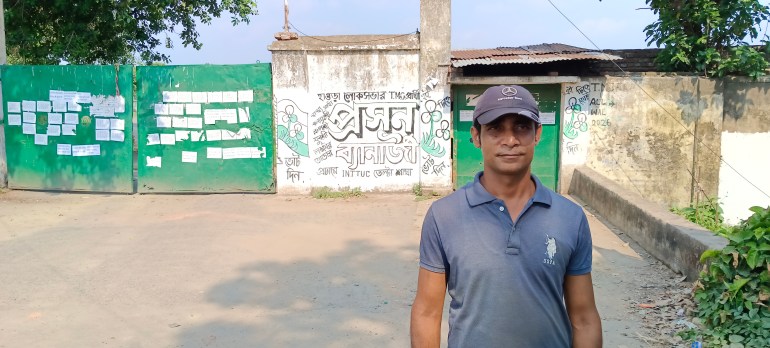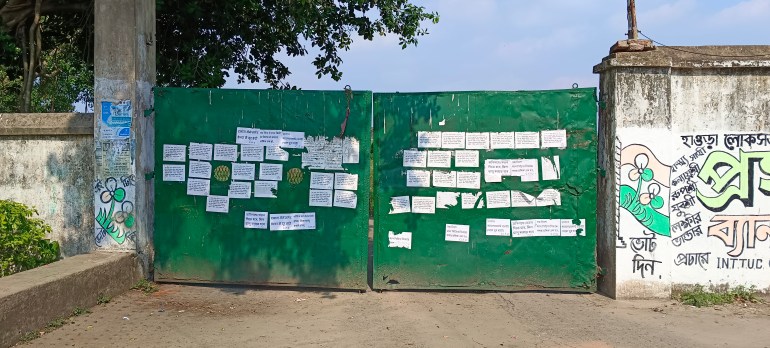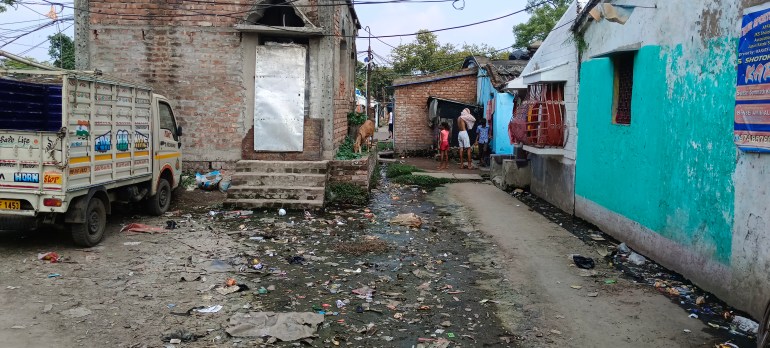The 40-year-old worked at the Delta Jute Mill in Manikpur village, about 20km (12 miles) from Kolkata, the capital of West Bengal state.
Since he lost his job, he has struggled to run his household and pay for food as well as the other needs of his parents, wife and 18-month-old daughter, he told Al Jazeera.
“Such disruptions had happened three to four times last year also, when work was suspended for a few months before resuming again,” Laskar said, adding that things have not improved this year. “The financial situation is pathetic and I am trying to migrate to another state to find work to feed my family.”
Laskar is one of the 4,000 workers of the Delta Jute Mill who have been out of a job, and income, since the mill stopped operations in February.
Jute, known as the golden fibre, is one of Bengal’s largest industries. It provides income to approximately 4.8 million people, including four million farmers, and fulfils 95 percent of India’s jute demand. India is the world’s largest jute producer and its second-largest exporter, after neighbouring Bangladesh.
The farmers, mill workers and their families also constitute a major voting bloc, with most politicians remembering them mostly only during the election season, the locals complain.
Polls in the jute belt of West Bengal state are scheduled for May 20 as part of the fifth phase of the ongoing weeks-long national election, which pits Prime Minister Narendra Modi and his Bharatiya Janata Party (BJP) against the Indian National Developmental Inclusive Alliance (INDIA), a coalition of 26 parties led by the main opposition party, Rahul Gandhi’s Indian National Congress.
In a recent address in Barrackpore, a jute hub in the state, Modi blamed the opposition Trinamool Congress (TMC) – the governing party in the state – for the demise of the once-thriving industry and the misery of its workers. He reminded workers that the federal government has made it mandatory for grains to be packed in jute bags, a guaranteed boost to business.
But workers in Laskar’s area, at least, are not buying that argument and blame both the TMC and the BJP for their run-down state.
Laskar says none of the politicians had ever visited them to inquire about their conditions after votes were cast. He says the last time a politician checked in on them was more than a decade ago when the Communist Party of India (Marxist), CPIM, was in power in the state. He plans to vote for the CPIM this time.

“The management of [the] Delta Jute Mill has stopped sending [cleaning staff] to staff quarters after the work suspension. We are living in the middle of overflowing drains, with water containing human waste entering our houses during heavy rains. The putrid smell makes it difficult to even stand there for a minute,” Asma Khatun, 25, who is married to another mill worker, told Al Jazeera as she held her daughter in her arms who, she said, frequently falls ill in the unhygienic conditions.
“Yet no politician has ever come to see us. Why should we vote?”
Local leaders claim the poor living conditions are the same in most jute mills.
“The owners of the mills pay scant regard to hygiene. Leaking drain pipes, overflowing drainages and garbage are a common scene everywhere. The management even doesn’t hesitate to snap the power lines after mills shut operations,” Kayum Sheikh, a CPIM leader in the region, said.
Workers say none of the mainstream candidates has come to seek their vote this time, maybe fearing the workers’ anger. But the CPIM candidate in the area has promised to sort out their problems, they said.
Mills in crisis
West Bengal has the distinction of housing India’s first jute mill, started in 1855 by a British entrepreneur in the Hooghly district, who brought jute spinning machinery from Dundee in Scotland.
West Bengal was chosen to be the home of the Indian jute industry due to the abundant supply of labour coupled with ample availability of coal and river connectivity. Coal was used as fuel to generate steam for the machines, and the finished products were transported via river to the ports.
The industry, currently pegged at about $1.8bn, primarily manufactures jute bags for packing food grains by the Indian government, and some other items like jute floor covering and raw jute, which is exported to places like the United States, the United Kingdom, the European Union and the Gulf nations.
In the financial year ending March 2023, India exported jute items worth $442m, as per data from the Indian Jute Mills Association (IJMA), an umbrella organisation of jute mill owners. From April 2023 to February 2024, according to the latest data available, it exported goods worth $322m.
Despite its contributions to the national and the state’s economies, the jute industry is in a crisis, resulting in mills closing or operating with reduced capacity.

West Bengal has about 85 jute mills, out of which eight have been shut down on account of losses, shortage of raw material and a manpower crisis, while the rest are running at just about 60 percent capacity.
The Indian government is the sole and biggest customer of the sector and procured about 3.6 million bales of jute bags (one bale is 500 bags) in 2023-24 for use by the Food Corporation of India (FCI) to pack grains.
In December, the federal government passed an order making it mandatory for all grains and 20 percent of sugar to be packed in jute bags.
But mill owners told Al Jazeera that despite that, there have been few supply orders from the federal government.
A letter sent to the federal government by IJMA and accessed by Al Jazeera dated May 14 shows that there had been fewer orders of jute bags from the government in April and no orders till mid-May.
“We received [207,000] bales order in April against the usual order of [216,000] bales during the same period. While in May, the industry gets orders of [303,000] bales every year, there has been no orders, till yet,” said a source privy to the issue.
As a result, mills are working at 60 percent of their capacity and the owners have laid off workers to cut back on costs.
This is in addition to other challenges in the sector in the last few years, including a cyclone in 2020 and the COVID-19 pandemic, both of which brought business to a standstill. The sector had barely started to recover, but output was once again hit in 2022 on account of poor rains. There is also “stiff competition” from Bangladesh with the mills there offering jute products at low prices on the back of high government subsidies, Rishav Kajaria, the deputy chairman of the IJMA, told Al Jazeera laying out the industry’s woes.
Pending gratuities
The crisis in the mills has badly affected the workers, who are dependent on them for livelihood.

As per the latest agreement between mill workers and owners signed earlier this year in January, newly recruited permanent workers are entitled to 485 rupees ($5.82) per day and liable for statutory benefits like provident fund, gratuity and staff quarters while contractual workers get 450 rupees ($5.40) and no benefits.
But permanent workers complain that their statutory benefits have been pending for a long time.
“Our main demand is the clearance of provident fund and gratuities that has been pending for the past several years. Several workers have died waiting for it but the mill owners simply refuse to pay citing financial losses. Workers who raise their voices against the dues are also threatened with dire consequences like forcing them out of staff quarters and snapping their power lines. It is a complete exploitation,” said Rakesh Jaiswal, secretary of the West Bengal Jute Permanent Workers Union.
Mill owners prefer hiring contractors over full-time workers to keep their costs low. As a result, at least 60 percent of the workforce today is made up of contract workers, he added.
Biswajit Mukherjee, a lawyer who has been fighting cases of the retired jute mill workers for outstanding gratuities in various labour courts and the Calcutta High Court, refuses to believe that mills are running in losses.
“It is difficult for any business to run at a loss for a long time. It is actually a ploy to evade income tax and other duties,” he said.
As per Mukherjee’s math, mill owners owe 4 billion rupees ($47.9m) in gratuity, of which only 600 million rupees ($7.2m) have been paid. But they mostly manage to evade the law as they have appointed proxies on the companies’ boards, he said.
The jute workers whom Al Jazeera spoke with said they were fed up with these tactics.
Mohasin Laskar, 62, a retired worker of the Delta Jute Mill, told Al Jazeera that this time he will vote for the CPIM candidate.
“The situation was not so bad during the Left rule as the local administration used to come for cleaning, even after the suspension of work. We at least had a hygienic place to live in. But things have become horrible now. We would like to again cast a vote in favour of the Left candidate this time,” he said.
But with the TMC’s majority in the state and the BJP trying hard to increase its vote share, did the CPIM candidate even stand a chance, Al Jazeera asked Laskar. He smiled and said, “You don’t know when the fortune can turn in politics. Let’s wait and watch.”
